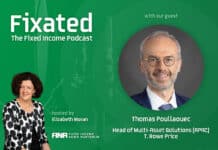
ETF investors continue to show strong interest in personalization; Familiarity with direct indexing grows – A report from Schwab Asset Management in the U.S.
Fixed income has been in focus this year and surprisingly, Millennial ETF investors are gravitating toward this asset class more than their older peers, according to the 2023 edition of “ETFs and Beyond,” an annual study by Schwab Asset Management. Millennials are not only more interested in learning about fixed income, but more of them plan to invest in fixed income ETFs in the next year, and the asset class makes up a larger portion of their portfolios compared to older generations.
ETF Investors Stay the Course
Despite a dramatically different investing environment from 2022, cool heads have prevailed among ETF investors this year. Rather than retreat in the face of uncertainties, most are staying the course or finding opportunities to increase investments in ETFs.
“ETF investors have navigated two dramatically different market environments over the last two years, yet their approach to investing and affinity for ETFs has remained extremely consistent,” said David Botset, Managing Director, Head of Equity Product Management and Innovation, Schwab Asset Management. “As we’ve seen historically, Millennials take a unique approach to how they invest, and that holds true for their approach to fixed income – an asset class that has garnered a lot of attention.”
Following the Money
Schwab Asset Management’s long-running study of ETF investors finds that cost remains the top factor when choosing an ETF and overall affinity for ETFs remains high. Eighty percent of ETF investors agree that ETFs are their investment of choice. The overwhelming majority (95%) say they are likely to consider purchasing an ETF in the next two years and about half (52%) say they have increased their allocations to ETFs in 2023. That said, ETFs as a share of portfolios has come down slightly from 33% last year to 29%.
The top three asset classes ETF investors plan to invest in over the next year are U.S. equities (55%), bonds/fixed income (47%), and real assets (43%). Most ETF investors (63%) believe the 60/40 portfolio is the right mix to meet their goals and their portfolios largely reflect that point of view, with 61% of their portfolios in equities and 39% in fixed income, on average.
New to the Party
In the years ahead, a significant driver of growth for ETFs may come from investors who haven’t yet bought their first ETF. Almost half of non-ETF investors (48%) say they are likely to purchase an ETF in the next two years, significantly higher than last year (41%). More than a third (34%) are extremely interested in learning more about ETFs – up from 27% in 2022. Among non-ETF investors who are likely to purchase an ETF in the next two years, 62% say the reason is to diversify their portfolios while 47% say it’s because ETFs are easy to buy and sell.
Also read: The Bond Market Stabilises or the World Ends
“We are at a moment where ETF investing has matured, and many investors are very comfortable using these products to execute their long-term plans. At the same time, there is a contingent of investors who haven’t tried ETFs yet and their interest is on the rise, so there is still significant runway for future education and adoption,” said Botset.
Millennials and ETFs – Next Level Adulting
Millennials’ love of ETFs continues to outpace other generations across several measures. They continue to be more heavily invested in ETFs, with 37% of their portfolios in ETFs. Eighty-nine percent say ETFs are their investment vehicle of choice and about a quarter of Millennials (22%) plan to significantly increase their investments in ETFs in the next year. Millennial ETF investors are broadly comfortable with ETFs, with 99% reporting they are extremely confident in their ability to choose an ETF that can help achieve their investment objectives.
The Pull of Personalization
Schwab Asset Management continues to see strong interest in more personalized investment offerings among ETF investors, with almost nine in 10 (88%) saying they are somewhat or very likely to personalize their portfolios more in 2023. Seventy-eight percent plan to make investments that align with their personal values. Millennials stand out as being most likely to personalize their portfolios in the year ahead and believe it is important to align their investments with their values and beliefs. Most ETF investors say it is extremely important to have more control over their investments (65%), greater ability to customize investments (61%), and that their investments are managed to optimize tax liabilities (61%).
Interest in direct indexing – an approach to personalized investing that is quickly gaining traction – remains strong, particularly among younger generations. Eighty-seven percent of ETF investors are familiar with direct indexing, up from 80% last year. Most ETF investors (69%) who are not already invested in a direct indexing solution say they are likely to invest in one in the next year. That figure rises to 80% for Millennials who are also much more likely to be extremely interested in learning about direct indexing (53%) than Gen X (34%) and Boomers (22%).
“The demand for personalized investing continues with Millennials leading the way. Investors’ desire to have more control and alignment of investments with their personal views is a major long-term shift that is still in the early innings,” said Botset. “Demand for personalization will be met by different types of products and solutions to meet different investor preferences – there won’t be one silver bullet solution. The takeaway: expect to see new innovations to help investors get where they want to go in the way they want to get there.”
To read the full report, click here.


































